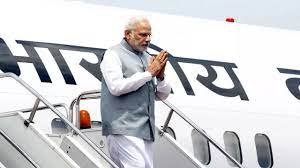On Friday, May 19, 2023, Prime Minister Narendra Modi set off on an important diplomatic journey, commencing a tour of three nations: Japan, Papua New Guinea, and Australia. The purpose of this tour was to attend three significant multilateral summits, including the highly anticipated gatherings of the G7 and the Quad. This voyage showcased India’s growing influence on the global stage and highlighted the nation’s commitment to fostering strong partnerships and alliances.
The first leg of Prime Minister Modi’s journey brought him to Japan, a key strategic partner and a longstanding friend of India. The Prime Minister’s visit to Japan held immense significance as it aimed to bolster the already robust bilateral relations between the two countries. During his stay, Prime Minister Modi engaged in a series of high-level meetings with Japanese officials, focusing on strengthening economic ties, enhancing defense cooperation, and promoting technological collaboration. Both nations discussed opportunities to expand trade and investment, particularly in areas such as renewable energy, infrastructure development, and advanced technology. The visit provided an excellent platform for India and Japan to reaffirm their commitment to a free, open, and inclusive Indo-Pacific region.
From Japan, Prime Minister Modi proceeded to Papua New Guinea, a Pacific island nation known for its rich cultural heritage and natural beauty. The visit to Papua New Guinea underscored India’s growing engagement with the Pacific region and its desire to forge deeper ties with nations in this part of the world. During his stay, the Prime Minister participated in the multilateral summit, which brought together leaders from various countries to discuss issues of regional importance, including climate change, maritime security, and sustainable development. India emphasized its commitment to supporting Pacific island nations in their development endeavors, including capacity building, infrastructure projects, and healthcare initiatives. The visit provided an opportunity for India to strengthen its partnerships in the Pacific region and contribute to its overall progress and prosperity.
The final leg of Prime Minister Modi’s tour took him to Australia, where he attended the much-anticipated G7 summit and the Quad meeting. The G7 summit, consisting of the world’s major advanced economies, provided a platform for global leaders to address pressing global challenges, including climate change, economic recovery, and global health. Prime Minister Modi actively participated in discussions, highlighting India’s efforts in combating climate change, its initiatives for sustainable development, and its commitment to multilateralism. The summit served as an opportunity for India to further cement its position as a responsible global player and contribute to shaping the global agenda.
The Quad meeting held immense significance as it brought together the leaders of India, the United States, Japan, and Australia—a group committed to promoting a free, open, and inclusive Indo-Pacific region. Prime Minister Modi engaged in productive discussions with his counterparts, focusing on deepening cooperation in areas such as maritime security, counterterrorism, and regional connectivity. The Quad meeting showcased India’s pivotal role in the Indo-Pacific and demonstrated its commitment to maintaining peace, stability, and prosperity in the region.
Prime Minister Narendra Modi’s tour of Japan, Papua New Guinea, and Australia marked a significant milestone in India’s foreign policy and demonstrated the nation’s growing influence on the global stage. The visit reaffirmed India’s commitment to strengthening bilateral and multilateral partnerships, fostering regional cooperation, and addressing pressing global challenges. By actively engaging in these multilateral summits, India showcased its willingness to contribute constructively to the international community and shape the course of global affairs. This tour underscored India’s position as a key player in the Indo-Pacific region and its commitment to a rules-based international order that promotes peace, stability, and prosperity for all nations involved.


